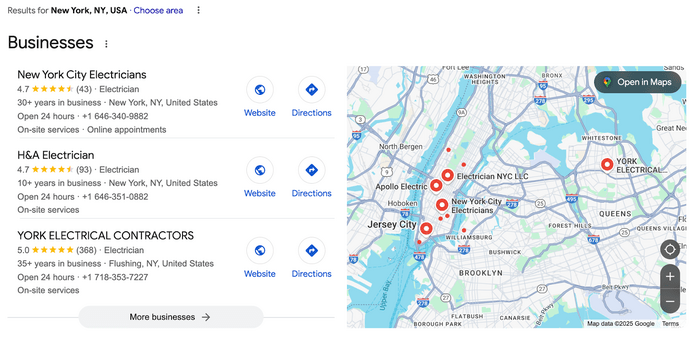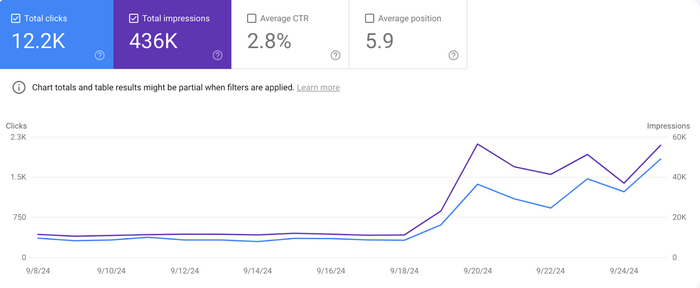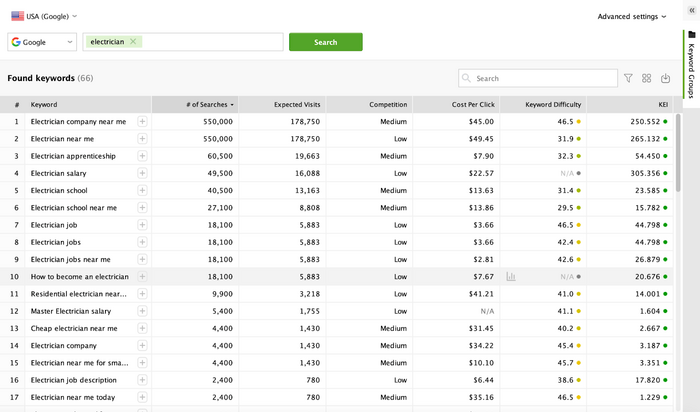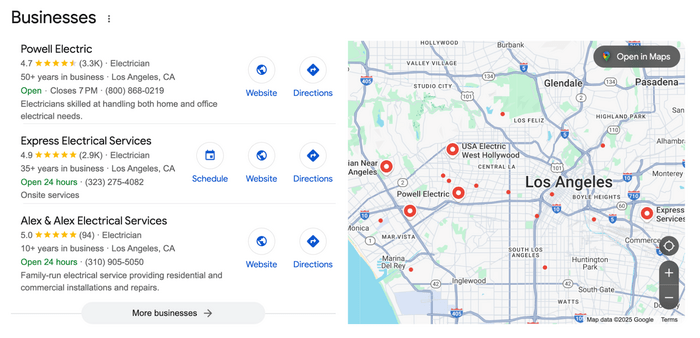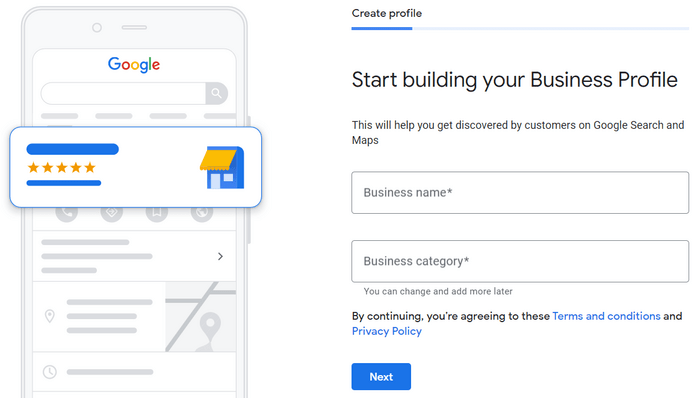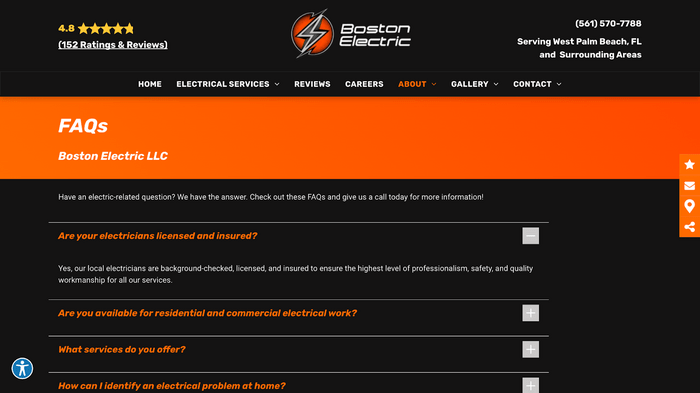Electrician SEO: How to Rank Higher, Get More Local Leads, and Grow Your Business

Contents
- What is SEO for electricians?
- Why SEO matters for electricians
- Keyword research for electricians
- Local SEO for electricians
- On-page SEO for electrician websites
- Technical SEO basics for electricians
- Content marketing for electricians
- Link building for local electricians
- Tracking your SEO performance
- Common SEO mistakes electricians make
- Final tips: how to stay ahead
You don’t need more hype. You need more qualified calls. And in 2025, that starts with showing up where people search—Google.
Whether you're wiring new builds or handling emergency repairs, people are searching for electricians online every day. But showing up in those search results isn’t luck—it’s strategy. That strategy is called electrician SEO.
This guide breaks down exactly how to use SEO to grow your electrical business. No jargon, no fluff. Just practical steps to get your site ranking, your phone ringing, and your calendar filling up—consistently.
Here’s what we’ll cover:
- How local search works and how to win at it
- The keywords that actually drive leads—not just clicks
- Website tweaks that turn visitors into customers
- SEO mistakes that cost electricians jobs every day
If you're ready to treat your website like the lead-generating asset it should be, you're in the right place.
What is SEO for electricians?
SEO for electricians is the process of making your website and online presence more visible in search engines, especially when people in your area are looking for electrical services. That means showing up when someone types in “breaker repair near me,” “EV charger installation [city],” or “24/7 electrician.” It’s about making sure your site ranks higher in organic results—not through ads, but through smart, consistent optimization that works long-term.
Done right, SEO for electricians improves three core areas:
- Relevance – Does your website match the searcher’s intent?
- Trust – Do search engines view your business as credible?
- Usability – Is your site fast, mobile-friendly, and easy to navigate?
This kind of SEO helps you appear in:
- The local map pack (the 3 business listings under the map)
- Organic search results for service-related keywords
- Voice searches like “Hey Google, find an electrician near me”
If you're running a local electrical business, this is one of the most cost-effective ways to generate qualified leads consistently, without relying on paid ads or lead-buying platforms.
Why SEO matters for electricians
Most people won’t scroll past the first few search results when they’re looking for a local service—and that includes electricians. If your business doesn’t show up near the top, your competitors are getting those calls instead.
SEO for electricians matters because it connects you with people who are actively searching for what you offer. These aren’t cold leads. They’re potential customers who already need help—they just haven’t found you yet.
Here’s what effective SEO can do for your business:
- Generate high-quality, local leads without paying for ads
- Get your business in front of customers when they’re ready to book
- Build long-term visibility instead of relying on short-term marketing spikes
- Help you outrank national lead gen sites that take a cut of your profit
If you want to future-proof your business, SEO is the marketing channel that keeps working—without needing daily babysitting.
Here’s a real-life example of how SEO efforts may start paying off relatively quickly:
Keyword research for electricians
Before you can rank on Google, you need to know what people are actually searching for. Keyword research is how you figure that out. It’s not just about finding the most popular terms—it’s about finding the right ones: specific, local, and tied to real customer intent.
For SEO for electricians, keywords often fall into three useful buckets:
- Service-specific terms: electrician, electrical repair, panel upgrade, fuse box replacement
- Location-based terms: electrician in [city], emergency electrician near me, licensed electrician [zip code]
- Problem-based searches: lights keep flickering, outlet stopped working, power keeps tripping
Use keyword tools like Google Keyword Planner or Rank Tracker to see how often these terms are searched in your area. You’ll want to target keywords with:
- Clear intent to hire or request service
- Local relevance to your service area
- Moderate competition (don’t waste time on national terms)
If you're just starting out, go for long-tail keywords. They're more specific, less competitive, and usually bring in more qualified leads. For example, “EV charger installation in Tacoma” will convert better than simply “electrician.”
The goal isn’t to chase volume—it’s to match what real customers are typing in when they’re ready to hire someone like you.
Local SEO for electricians
Most electricians work within a specific geographic area, which makes local SEO one of the most important parts of your strategy. If someone searches “electrician near me” or “emergency electrician [city],” Google’s going to show them a list of nearby businesses—known as the local map pack. That’s where you want to be.
To rank in local searches, focus on three things: consistency, relevance, and proximity.
Start by setting up and optimizing your Google Business Profile.
Make sure to fill out the following:
- Use your exact business name, address, and phone number (NAP)
- Choose the right primary category (e.g. “Electrician”)
- Add service areas, photos, and business hours
- Write a short but clear business description that includes your main services and locations
Next, make sure your NAP info is consistent across all online directories—Yelp, Angi, Houzz, local chamber listings, etc. Inconsistent info confuses Google and can hurt your rankings.
Then, focus on reviews. Google uses them to judge trust. Ask happy clients to leave reviews after a job, and always respond—good or bad. Active, recent reviews help your profile stand out and signal credibility.
Finally, create local landing pages if you serve multiple cities. Each page should target one location, include relevant services, and answer real questions your customers have. No copy-paste across pages—Google notices.
If you want to own your local area, this is how you start showing up above the noise.
On-page SEO for electrician websites
On-page SEO is about making sure every page on your website is clear, relevant, and useful—both to your visitors and to Google. It’s how you tell search engines, “This page is about residential wiring in [your city],” and how you help potential customers trust what they see when they land on it.
Start with your core service pages. Each one should target a specific keyword (like “circuit breaker replacement”) and match the search intent. Avoid combining all your services onto a single page—break them out so each can rank on its own.
Every page should include:
- A clear, descriptive title tag with your target keyword and city
- A meta description that encourages clicks (think benefit + location)
- Headings (H1, H2, etc.) that structure your content logically
- A short intro explaining what the service is and who it’s for
- A call to action like “Request a quote” or “Schedule service today”
Use internal links to connect related pages—like linking your EV charger page to your residential services overview. This helps users navigate and helps Google understand your site structure.
Don’t forget images. Use relevant photos, compress them for speed, and add alt text that describes what’s shown (not just “image1.jpg”). If it’s a photo of your work in a specific neighborhood, include that detail.
Finally, consider adding FAQs to your pages. Questions like “How much does panel replacement cost?” or “Can I DIY a light fixture install?” not only help users—they’re great for voice search and can land you in featured snippets.
Strong on-page SEO turns your site from a digital brochure into a high-converting lead generator.
Technical SEO basics for electricians
You don’t need to be a developer to get the basics of technical SEO right—but you do need to make sure your site works properly behind the scenes. Why? Because if Google can’t crawl or index your site, it won’t rank—no matter how good your content is.
Start with these essentials:
- Make sure your site is mobile-friendly. Most local searches happen on phones. If your site doesn’t load fast or look good on mobile, users will bounce—and so will your rankings.
- Use HTTPS. It’s a trust signal for both users and search engines. Your site should have an SSL certificate—no exceptions.
- Improve site speed. Compress images, reduce unnecessary plugins, and use caching to make your pages load faster. Use tools like Google PageSpeed Insights to test performance.
- Fix crawl errors. Use Google Search Console to check for 404 pages, redirect loops, or blocked resources that might prevent indexing.
- Submit a sitemap. A sitemap helps Google understand your site structure and index all your pages properly.
- Keep your URLs clean. Use short, readable URLs like /panel-upgrades instead of /services?id=47.
One more thing—avoid duplicate content. If you create separate city pages, each one should be unique. Don’t copy and paste the same service description across multiple locations. It dilutes your rankings and hurts trust.
Technical SEO isn’t about perfection—it’s about making sure nothing stands in the way of your site being found and understood.
Content marketing for electricians
Content marketing isn’t just for bloggers or big companies—it’s one of the most effective ways for electricians to build trust, rank for more keywords, and drive leads over time. Think of your content as a long-term sales rep: it educates, builds credibility, and brings in traffic 24/7.
Start by answering the questions your customers already ask:
- What’s tripping my circuit breaker?
- Do I need a permit for panel upgrades?
- How much does EV charger installation cost?
- Can I replace a light switch myself?
These are perfect blog topics. They’re packed with keywords, match real search intent, and position you as the expert.
Content types that work well for electrician SEO:
- Blog posts that answer common electrical questions
- How-to guides or safety checklists
- Location-specific posts (“Wiring old homes in [city]”)
- Service comparison pages (e.g. “breaker panel vs fuse box”)
- Case studies showing your work in local homes or businesses
Write for people first, search engines second. Keep it clear, direct, and useful. You don’t need to write essays—just focus on being helpful and local. Mention your service areas naturally, and link to relevant pages on your site.
Pro tip
Don’t publish once and forget it. Update old content, add FAQs based on customer calls, and expand posts that are getting traffic.
The more quality content you publish, the more chances you give Google to rank your site—and the more trust you build with people who are thinking about hiring you.
Link building for local electricians
Backlinks—links from other websites to yours—are one of Google’s top ranking factors. They signal that your business is trustworthy and authoritative. But for electricians, the goal isn’t just to get more links. It’s to get the right ones: local, relevant, and earned.
You don’t need a thousand backlinks. A few high-quality links from reputable local sources can move the needle more than dozens of low-quality ones.
Here’s how to build links that actually help:
- Get listed in local directories: Sites like Yelp, Angi, Houzz, BBB, and your local chamber of commerce are must-haves. Make sure your info is accurate and matches your website.
- Partner with other local businesses: Offer to swap mentions on each other's websites if you refer clients or collaborate on jobs (e.g. general contractors, plumbers, solar installers).
- Sponsor a local event or charity: Many events or community organizations will link back to your site as a sponsor.
- Write or be featured in local news: Pitch a short story or expert tip to your town’s business journal or local blog—“5 electrical upgrades homeowners should know about,” for example.
- Publish case studies: Highlight local jobs you've done, including neighborhood names and before/after photos. If clients are happy, ask if they’ll share the post.
Avoid buying backlinks or joining spammy link schemes. Google’s getting better at spotting those—and penalizing the sites that use them.
Solid local backlinks are like online referrals. They build your domain authority and help you rank higher in your service area.
Tracking your SEO performance
If you’re putting in the work, you need to know what’s actually paying off. Tracking your SEO performance helps you see what’s working, what’s not, and where to focus next.
You don’t need complex dashboards or expensive reporting tools. Start with the basics:
- Google Search Console: See what keywords people are using to find your site, how many impressions and clicks you’re getting, and which pages are performing best.
- Google Analytics 4: Track how visitors behave once they land on your site—what pages they visit, how long they stay, and whether they convert (calls, form submissions, etc.).
- Rank tracking tools: Use tools like Rank Tracker to monitor your positions for specific keywords over time. Focus on the ones that bring in leads, not just traffic.
Metrics to watch:
- Keyword rankings (especially local terms)
- Organic traffic growth
- Click-through rate (CTR) from search results
- Calls, quote requests, or contact form submissions
- Bounce rate and time on page
Set a monthly reminder to check in. If you’re not getting more visibility, leads, or conversions after a few months, it might be time to adjust your content, improve your pages, or tighten up your local SEO.
SEO isn’t just about being visible—it’s about getting results. Tracking performance is how you stay on course.
Common SEO mistakes electricians make
Even with the right tools and intentions, it’s easy to get SEO wrong—especially when you’re juggling it alongside running a business. Here are some of the most common mistakes electricians make with SEO, and how to avoid them:
- Ignoring local SEO: If your Google Business Profile isn’t optimized or you’re not targeting location-based keywords, you’re missing the customers closest to you.
- Using the same content for every service area: Duplicating pages for each city or neighborhood with only the name changed doesn’t work anymore. Google wants unique, useful content.
- Skipping keyword research: If you’re targeting broad, high-competition terms like “electrician” without context, you’ll struggle to rank. Focus on specific services and local intent.
- Neglecting mobile optimization: If your site isn’t easy to use on a phone, it won’t rank well—and people won’t stick around.
- Forgetting about calls to action: If your pages don’t clearly tell people what to do next (call now, get a quote, book service), you’ll lose leads even if you rank well.
- Not tracking results: Without performance data, you’re flying blind. SEO isn’t set-it-and-forget-it—it’s something you refine over time.
Most of these issues are simple to fix once you know they’re there. Spot them early, adjust your strategy, and you’ll start seeing real gains from your SEO efforts.
Final tips: how to stay ahead
SEO isn’t something you set up once and forget. It’s an ongoing part of growing your electrical business online. But that doesn’t mean it has to eat up your time. Staying ahead just means being consistent with a few key habits.
Start by keeping your website and Google Business Profile accurate and up to date. If your hours change, your services shift, or you expand into a new area, reflect that online. Small updates like these signal to both Google and your customers that you’re active and reliable.
Ask for reviews on a regular basis. You don’t need hundreds overnight—just a steady flow. A quick follow-up after a job, a text, or even a printed card can go a long way. These reviews help boost your visibility and build trust with new clients.
Keep an eye on your competitors. If someone starts outranking you, take a look at what they’re doing. Maybe they’ve added a new service page, published a guide, or earned local backlinks. You don’t need to copy them, but you can learn from their momentum.
Keep publishing content, even if it’s once a month. Focus on real questions your customers ask—topics that actually help. SEO rewards businesses that stay active and provide value over time.
And finally, don’t get distracted by small ranking changes. SEO performance naturally fluctuates. What matters is the long-term trend. Are you showing up more often? Getting more calls? Booking better jobs? Stay focused on what matters most—results.


